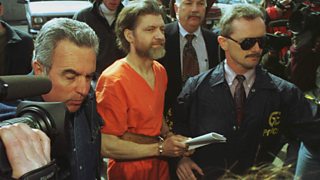What can the Unabomber case teach us about anti-tech radicalisation?
This week on Bad People we discuss the fascinating case of the US anti-tech terrorist Theodore Kaczynski, better known as the Unabomber.
The media loved the narrative of the genius who became a villain, but there’s much more to his mind than that. Perhaps most interesting are his eerily prescient and relatable fears about tech and a deep concern for humanity’s self-destruction which facilitated his descent to the violent side of technophobia.

Cabin in the woods
Kaczynski was a gifted student who graduated with a doctorate in Mathematics from Harvard University and went on to teach at Berkeley. Then one day he resigned from his post, moved to a secluded cabin in the woods, and taught himself bomb making.

From his lonely cabin, between the late 1970s and the mid 1990s, Kaczynski created a climate of fear in the US by planting and mailing bombs. Among his first victims were academics and the president and passengers of an airline, hence the FBI’s name for the case: UNABOMB, which stands for university and airline bomber.
Although the victims became more varied, the most common targets of his attacks continued to be academics throughout his almost two decades of terror.
But why did he ever make this transition from successful academic to lonely terrorist? It seems that two things came together; Schizophrenia jumbled his sense of what was real and made paranoid thoughts come easily, and a few books gave his brain food for extreme rumination.
Philosophy of technophobia
Although he was finally caught in 1996, many of Kaczynski’s fears around technology are still voiced by many people today. What’s more curious is that they were also already voiced decades before him.

Kaczynski created a climate of fear in the US."
According to his manifesto, one major inspiration for him was the celebrated French Christian anarchist philosopher Jacques Ellul. Kaczynski had read at least three of Ellul’s books, The Technological Society, Autopsy of Revolution, and Propaganda. What is disquieting about Ellul’s books is just how much they touch on fears that many people today still have.
Ellul was a respected philosopher who wrote many books that centred around his dread that humanity would be changed forever for the worse by technology.
As he writes in The Technological Bluff, technology no longer faces opposition and it “envelopes us, making us believe anything, and, far worse, changing our whole attitude”. Decades before social media he foresaw how technology would change our minds, and how misinformation would abound.
Technological Bluff
In his writings on the existential dangers of technology, Ellul writes that some people are so blinded by the possibilities of tech that they fail to appreciate the risks.

The most common targets of his attacks continued to be academics throughout his almost two decades of terror."
These technophiles succumb to the “technological bluff”. The bluff is that tech promises solutions, but what it really offers is a cascade of new problems that need to be fixed. Those who are blinded, argues Ellul, think that the solution to new tech problems is always more tech.
For example, Ellul might argue that mass access to cars has a major downside of greenhouse gases, which is a problem some expect to fix with new carbon capture technology. But carbon capture will have its own problems. The solution? More tech. And, repeat.
All technologies, argues Ellul, come with costs and at some point the whole system becomes uncontrollable. To Ellul, the answer isn’t more tech but less. Consistent with this view, the answer to greenhouse gases isn’t carbon capture, it’s fewer cars.
If you found yourself nodding along to this view of the world, you can see why a genius like Kaczynski also found them compelling. They were a core part of his intellectual background, the bridge between his academic world and his bombmaking cabin in the woods.
Things really spiralled for Kaczynski when he got access to magazines published by radical environmentalists, who were calling for violent action. All he could think about was our extinction, and he came to believe that it was up to him to kill the people who were insisting on keeping the march of technology going. The outcome was devastating.
Learn more about the Unabomber, and let us debunk some commonly held misconceptions about this fascinating case, on the most recent episode on the 91热爆 Sounds podcast Bad People. We cover the Unabomber case in a two part special.

Bio
Dr Julia Shaw is a research associate at University College London and the co-host of the Bad People podcast on 91热爆 sounds.
She is an expert on criminal psychology, and the author of two books “Making Evil: The Science Behind Humanity’s Dark Side” and “The Memory Illusion: Remembering, Forgetting, and the Science of False Memory.
Her website: , and twitter



